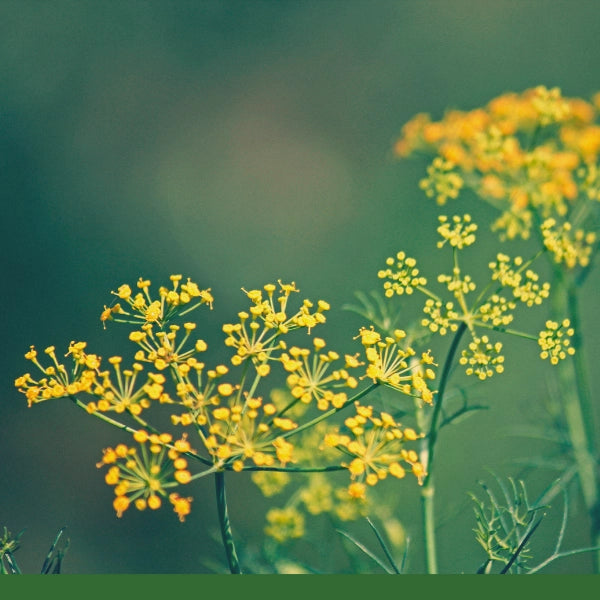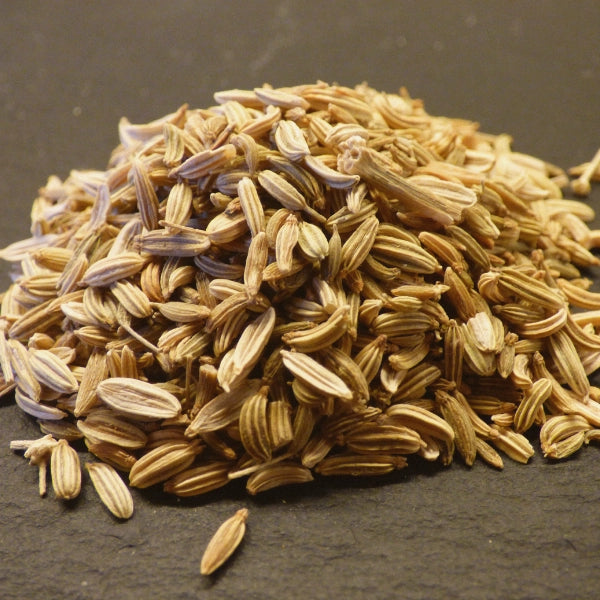Fennel Seed, Whole (Foeniculum vulgare) - Dried Herb, Organic
- Regular price
- $10.14
- Sale price
- $10.14
- Regular price
-
- Unit price
- per
Couldn't load pickup availability


Fennel is a flowering plant species in the Apiacae family which includes umbellifers such as carrot, parsley, celery and lovage. Fennel can be an annual, biennial, or perennial plant that can grow up to 6 feet tall. It has bright yellow umbrella shaped flowers and green feathery leaves that are similar to those of its cousin dill.
It is indigenous to the shores of the Mediterranean and southern Europe but has become widely naturalized in many parts of the world, especially on dry soils near the sea-coast and on riverbanks. The name Fennel originates from the Greek word for "marathon”, which is the famous battle at Marathon in 490 BC. Where supposedly an ancient Athenian Pheidippides or Greek Military man carried a Fennel stalk for 150 miles, two day run to Sparta to gather soldiers for the battle of Marathon with Persia. The battle itself may have been waged on a field of Fennel.
Fennel is a herb with a extensive history of medicinal, magical and culinary uses. Fennel was highly valued in the ancient world by Romans, Greeks, Egyptians, Chinese, and Indians for its properties in supporting digestion, as an expectorant for the lungs, and as a protective charm to drive away evil spirits. Ancient Chinese and Hindus used Fennel as a remedy for snake bites and the Romans believed that Fennel improved stamina and eyesight.
Fennel seeds are popular culinary herb and vegetable throughout Europe and used as an aromatic spice in a range of Ayurvedic and Mediterranean dishes. Fennel Seeds have been used in various countries baked into breads, biscuits, stuffing, Italian sausages and added to sweet pickles and sauerkraut.
The essential oil from the seeds is know to be added to perfumes, soaps and cosmetics. Fennel oil or extracts are also used to flavour prepared foods that include meat, ice cream, baked goods, condiments and beverages, including liqueurs such as gin and absinthe. Fennel Seed provide important nutrients, such as vitamin C, calcium, magnesium, potassium and manganese
Properties:
The energetics and taste of Fennel Seed are sweet, bitter, acrid, warming and drying. Fennel has an affinity towards the digestive system, respiratory system, heart, eyes, musculoskeletal system, liver, kidneys, spleen and female hormones. As a digestive tonic combine Fennel with Catnip, Lavender or Lemon Balm. As a female tonic for menstruation or menopause combine Fennel Seed with Raspberry Leaf, Red Clover or Don Quai.
How to use:
1 teaspoon of Fennel Seed to one cup of boiling water. Infuse for 15 minutes, strain and drink up to three cups a day.
Use as a condiment in foods such as fish soup or stock, soft cheese for spreading, biscuits or bread, curries and pork dishes such as stews and casseroles.
Cautions & contraindications:
Fennel Seeds are very gentle, but there are rare cases in which Fennel has been said to cause allergic reactions in the skin and respiratory tract.
This information is for educational purposes only and is not intended to diagnose, treat or cure any disease or illness. Please consult your healthcare provider prior to the use of this product if you are pregnant, nursing, taking medications or have a medical condition. Individual results may vary.

